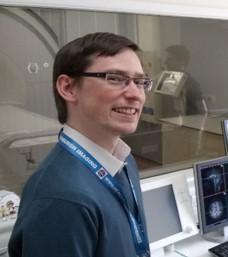Tutor of the Month #4: Michael Stringer
Each month we profile one of our fantastic postgraduate tutors. This December we chat to Dr Michael Stringer, tutor on the Applications in Disease module for various Imaging and Neuroscience MSc programmes.
1. Please tell us a bit about your academic background and how you came to be a tutor for the Edinburgh Imaging Academy.
I studied mathematics initially before moving into neuroimaging through my PhD at the University of Aberdeen, which involved analysing structural and functional magnetic resonance imaging (MRI) scans from patients with mild stroke-like symptoms.

This led to my current post as a research fellow in Professor Joanna Wardlaw’s group working across several studies on small vessel disease (SVD) to try to better understand how SVD evolves and progresses.
After starting I shared an office with the Edinburgh Imaging Academy team – Jane Barr, Nathalie Wallace and Charis Alexakis – who as well as helping me settle in introduced me to the programme director, Professor Andrew Farrall.
At the time they were looking for someone to cover the in-course activity for the Applications in Disease module, which was a great starting point to my involvement with the programme.
2. Which area of expertise do you teach? How will students benefit from learning more about this particular subject?
The in-course activity is part of three modules:
- Applications in Disease Research and Clinical Applications, for students on the Imaging and Neuroimaging for Research MSc, postgraduate diploma and certificate programmes
- Neuroimaging research for graduate neuroscientists, for students on the MScR Integrative Neuroscience and the MSc Stem Cells and Translational Neurology
It introduces the students to the concepts and practices needed to conduct systematic reviews, allowing them to develop a research question and search strategy to find relevant material. Subsequently they give feedback to two of their peers and respond to peer feedback on their own review.
The activity develops crucial skills for academic research (e.g. how to find the most relevant or latest research in a particular area), and is also very useful preparation for those who go on to Masters level – where they will often conduct a review for their dissertation.
However, the skills are also highly transferable. You learn how to identify what information you need to find, systematic approaches to searching for the information you want and how to filter it to get the content you want without having to sift through too much irrelevant content.
3. What do you feel are the main advantages of online learning?
Online learning allows students from across the world to engage with their peers, whatever their backgrounds or locations. As such it makes learning more accessible to those not lucky enough to have a prestigious University like Edinburgh nearby, or who for professional or personal reasons may be unable to commit to on-campus study.
It also allows students to interact with and benefit from the expertise of academics and clinicians whose timetables can make it more difficult to accommodate semesters of in-person lectures.
4. What do you enjoy most about being a tutor?
As I tutor on a first semester module, for many of the students it is their first taste of postgraduate study.
I most enjoy seeing how well the students take to it – particularly if they find it takes a bit of time to adjust or need some extra help to get started.
It is also great to see when students start to interact more on the board. As they often have complementary expertise, it can lead to some very interesting insight and discussions.
5. Why would you recommend Edinburgh Imaging Academy programmes to potential applicants?
(Neuro)imaging is a fascinating field to study, work or research in. It is highly interdisciplinary, operating at the interface between maths and medicine, physics and biology, computing and psychology.
That all makes for a very stimulating environment where you are always learning something new. The Edinburgh Imaging Academy programmes are an excellent gateway into imaging, whether you want to move into it, work in a related profession already and want to improve your knowledge, or just have an interest in it and want to know more.
Related Links
Tutor of the Month #2: Catriona Barr
Online Study - Frequently Asked Questions


